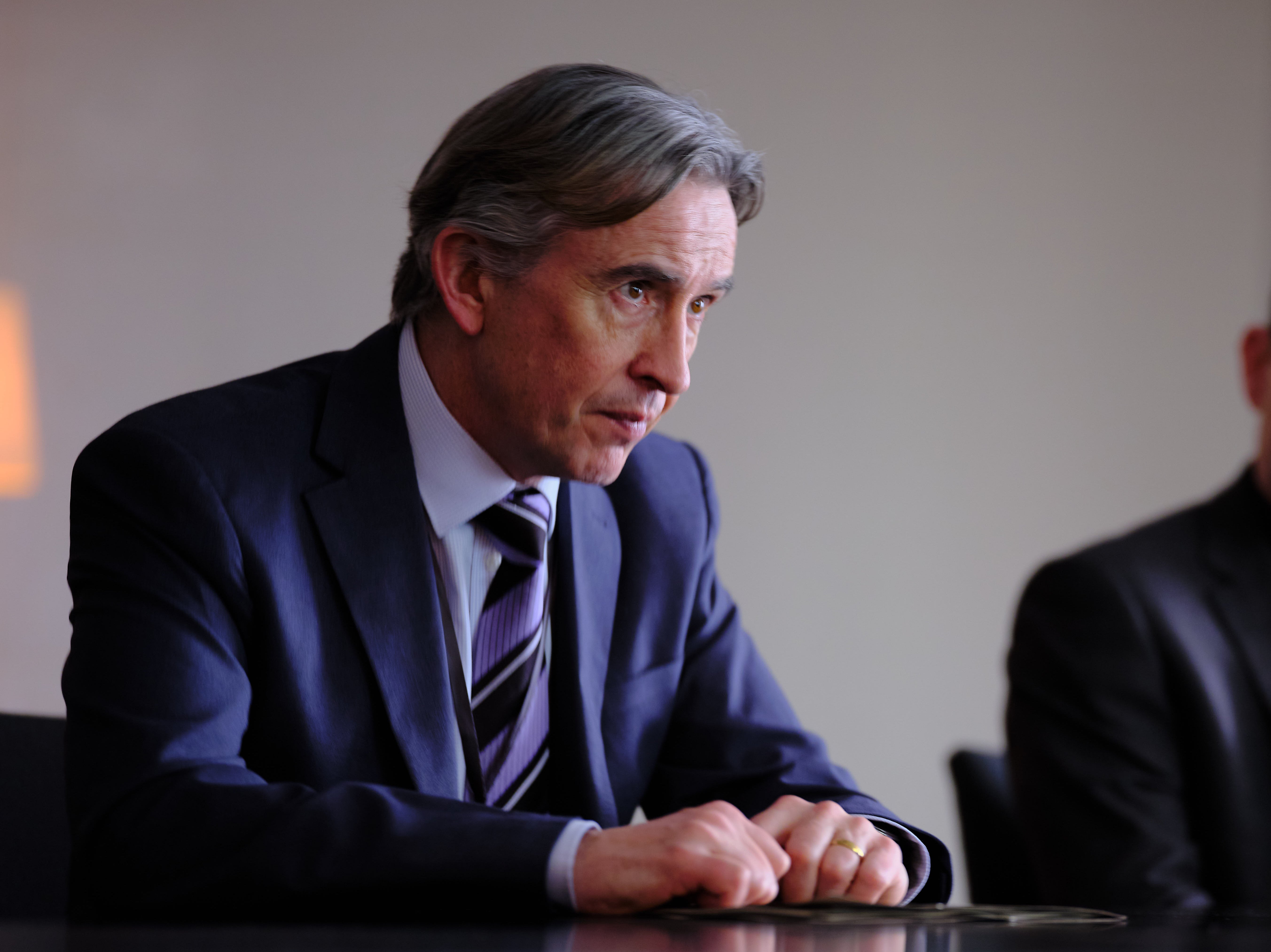Steve Coogan and the makers of the new Stephen Lawrence series: ‘This story is ever more relevant’
The actor stars as the detective who led the investigation into the deadly attack on Lawrence and institutional racism in the Met police. It’s a case that resonates more than ever today, he and the show’s creators and cast tell James Rampton


Steve Coogan would be the first to admit that he has not frequently portrayed nice guys. “I don’t often play decent people. I normally play people who are dysfunctional,” says the actor. But all that is changing with his latest project. Previously best known for his flawed characters – Alan Partridge, Tony Wilson, Paul Raymond, Stan Laurel, a billionaire not entirely dissimilar to Sir Philip Green in Greed and “Steve Coogan”, a distorted version of himself in The Trip – he is now taking the role of “good cop” DCI Clive Driscoll in Stephen, a potent new ITV drama about the investigation into Stephen Lawrence’s killers.
Coogan, 55, spent many hours on a video call with Driscoll, the detective who proved instrumental in convicting two of Lawrence’s murderers, in preparation for the role. He says simply: “I wanted to play a decent person.”
But the role of Driscoll was also impossible to turn down. “You can’t not do it,” says Coogan. “When someone offers you something like this, it’s both a privilege and a responsibility. It was an honour to play and celebrate common decency, and I couldn’t say no.”
Co-written by Frank Cottrell-Boyce (Hilary and Jackie) and his son Joe (Treasure), the three-part series and is a sequel to Paul Greengrass’s enormously influential 1999 film The Murder of Stephen Lawrence. The story is etched into our collective memory. On 22 April 1993, Lawrence, a young black student who wanted to become an architect, was brutally stabbed to death in an unprovoked attack by a white racist gang while he was waiting for a bus in Well Hall Road, Eltham.
Even though his parents, Doreen and Neville Lawrence, were aware of the identity of their son’s killers, the original investigation did not succeed in convicting any of the suspects. The parents’ subsequent and remarkable campaign for justice prompted The Stephen Lawrence Inquiry, led by retired judge Sir William Macpherson.
In 1999, the inquiry reached the landmark conclusion that the Metropolitan Police were institutionally racist. It triggered widespread changes in the law and police practices and radically altered our understanding of racial inequality in the UK. Six years on from the inquiry, though, the Met were no closer to securing any convictions for Stephen’s murder. While The Murder of Stephen Lawrence focused on the crime itself and the woefully inadequate initial investigation by the Met, Stephen recounts Doreen (Sharlene Whyte, Small Axe) and Neville’s (Hugh Quarshie, Holby City) subsequent tireless battle to achieve justice for their son.
The series shows how Driscoll won over the initially sceptical Doreen and Neville and then, in close collaboration with them, mounted an investigation that finally, 19 years after his death, resulted in the convictions of two of the gang who killed Stephen.
The TV drama reunites many of the creatives behind the original film, including executive producers Mark Redhead (Bloody Sunday), who produced the drama in 1999, Greengrass (the Bourne movies), who wrote and directed The Murder of Stephen Lawrence, and Quarshie, who reprises the part of Neville.

Redhead explains why he was so eager to return to the case. “It remained an incredibly important story and Neville and Doreen became incredibly important figures in our national culture. I kept up with them after we made our programme and went to the trial in 2012.” Then he read Clive’s book “and was really moved by it,” he continues. “The story remained amazingly relevant, and I felt it needed completing. So I went to ITV and said, ‘I’d really like to take this forward’, and they embraced it very quickly.”
Coogan, who is talking to me on Zoom, reveals he was particularly drawn by the fact that Driscoll is very far removed from the stereotype of a maverick TV detective.
“There are so many clichés about a cop who does a good job by breaking the rules, but this was a policeman who did a good job by sticking to the rules and laboriously going through them point by point in a very quiet, disciplined, dogged way,” he says, a thoughtful presence who in person exhibits none of Partridge’s trademark bumptiousness. “It’s a story we don’t often hear and it’s important.
“In light of all the awful things that happened, it’s important to remind people in any drama that there are decent people in the world. The world isn’t full of cynics. There are decent people trying to do the right thing in the face of hatred and cynicism. Clive Driscoll decided to help two people he didn’t know just on the basis that it was the right thing to do.”

One point Coogan is keen to reinforce is that Stephen is not a “white saviour” drama – it is Neville and Doreen who propel the narrative. “It’s important we don’t lose track of what the story’s about, which is an imperfect justice that was arrived at for Neville and Doreen. It’s their story,” the actor says. “Hugh and Sharlene really did the heavy lifting; all I had to do was react to what they were doing.”
Coogan has played real people before, including Wilson, Raymond and Martin Sixsmith in Philomena, the true story about a journalist helping a woman find her long-lost son, and he says he prefers that to dreaming up a character himself. “In some ways, playing a real person, I think, is easier than playing someone you have to invent. Because a real person has lived a real life for you, and they’ve done all the research. All you have to do is honour who they are in the way you play them.
“Clive was a very attractive person to play,” continues Coogan. “He has a sense of humour, he doesn’t go around with a shield and sword of truth. He just quietly does his job. I thought, ironically, it was nice to celebrate someone who wouldn’t celebrate themselves in this story.”
The actor delves deeper into what makes Driscoll such a good cop. “The old Sweeney school of policing has had a bad rap – quite rightly. But Clive talks about ‘common sense coppering.’ I said to him, ‘how come you didn’t end up becoming one of those coppers that took backhanders?’
“And he said, ‘well, my mother was a single parent and she was honest, decent. I thought I’d be letting her down if I did anything other than be honest’.”
Twenty-eight years after it happened, the murder of Stephen Lawrence sadly remains highly topical. Given the currency of the Black Lives Matter movement, which is powered by continuing, egregious examples of police racism, this infamous case still strikes a chord today.

Sharlene Whyte is saddened that this case remains relevant. “I’ve got an 18-year-old black teenager who’s outside and having all the dealings with police, so it’s quite tricky out there at the minute,” she says of her own child. “The idea that Stephen wouldn’t come back home after going to see his friends just terrifies me. It’s just made me realise that I’m not sure, sadly, how much things have moved on today.” She adds that Stephen’s case, “just highlighted that I’m so precious about my son at this age”.
Quarshie has very similar worries. “I’ve got a son who is now Stephen’s age, and every day when he goes to college, I feel that concern which sometimes spills over into anxiety – with all of the knife crime in London and so on.
“The pleasure and pride you take in your children and their achievements, just watching them grow – sometimes tiptoeing a few paces behind is that anxiety, especially if you are a parent of a black or mixed-race kid. You know they will be subject to more stresses and tensions growing up than white kids.”
Redhead, too, deeply regrets that Stephen, which was made with the full support of Doreen and Neville, still has contemporary resonance. “When I pitched it to ITV four years ago, it was relevant, but it has sadly become more relevant and timely as time has gone on. There is a line that Doreen has in our drama in her speech at St Martin-in-the-Fields with the prime minister, the Archbishop of Canterbury and others in attendance.
“She says she is really grateful they are there, but she really wishes they weren’t and she wishes she wasn’t there. That’s my feeling about this. I wish this drama was not necessary, that we were in such a place that it would not be necessary to keep returning to this story, but it is important.”
Redhead continues: “I know of some younger people who have never heard of Stephen Lawrence, who don’t know the story at all. You have to keep reminding people of what this story is about and why it is ever more relevant. We also reflect the fact that Stephen is not a unique case.”
What do the cast and crew hope that viewers will gain from watching Stephen, then? “I hope that people take away from it that doing the right thing sometimes makes sense, and there are lots of reasons to do the right thing,” says Coogan.
“Often people are faced with choices and choose whatever’s the most expedient, what’s going to reward them. But perhaps if you do the honourable thing, that’s always the best choice, because so many things roll out from that which benefit everyone. Being good makes sense.”
Unfortunately, the case is still not completely closed – other suspects have not yet faced trial for Stephen’s murder. “There was a moral imperative to tell this story,” Quarshie concludes. “That also fuelled the original Paul Greengrass drama and that has been carried on into this later story. There was a sense that this is a story that needs to be told and we wanted to tell it in the right way. I think we can be proud of that. It was the right thing to do.
“But it ain’t over until it’s over. They have convicted two of the killers, but not others involved. We hope justice will be done one day.”
‘Stephen’ begins on ITV at 9pm on Monday 30 August
Join our commenting forum
Join thought-provoking conversations, follow other Independent readers and see their replies
Comments





Bookmark popover
Removed from bookmarks